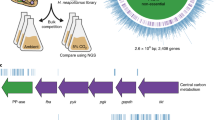Abstract
Alkaliphilic Bacillus species that are isolated from nonmarine, moderate salt, and moderate temperature environments offer the opportunity to explore strategies that have developed for solving the energetic challenges of aerobic growth at pH values between 10 and 11. Such bacteria share many structural, metabolic, genomic, and regulatory features with nonextremophilic species such as Bacillus subtilis. Comparative studies can therefore illuminate the specific features of gene organization and special features of gene products that are homologs of those found in non-extremophiles, and potentially identify novel gene products of importance in alkaliphily. We have focused our studies on the facultative alkaliphile Bacillus firmus OF4, which is routinely grown on malate-containing medium at either pH 7.5 or 10.5. Current work is directed toward clarification of the characteristics and energetics of membrane-associated proteins that must catalyze inward proton movements. One group of such proteins are the Na+/H+ antiporters that enable cells to adapt to a sudden upward shift in pH and to maintain a cytoplasmic pH that is 2–2.3 units below the external pH in the most alkaline range of pH for growth. Another is the proton-translocating ATP synthase that catalyzes robust production of ATP under conditions in which the external proton concentration and the bulk chemiosmotic driving force are low. Three gene loci that are candidates for Na+/H+ antiporter encoding genes with roles in Na+- dependent pH homeostasis have been identified. All of them have homologs in B. subtilis, in which pH homeostasis can be carried out with either K+ or Na+. The physiological importance of one of the B. firmus OF4 loci, nhaC, has been studied by targeted gene disruption, and the same approach is being extended to the others. The atp genes that encode the alkaliphile's F1FO-ATP synthase are found to have interesting motifs in areas of putative importance for proton translocation. As an initial step in studies that will probe the importance and possible roles of these motifs, the entire atp operon from B. firmus OF4 has been cloned and functionally expressed in an Escherichia coli mutant that has a full deletion of its atp genes. The transformant does not exhibit growth on succinate, but shows reproducible, modest increases in the aerobic growth yields on glucose as well as membrane ATPase activity that exhibits characteristics of the alkaliphile enzyme.
Similar content being viewed by others
Author information
Authors and Affiliations
Additional information
Received: January 22, 1998 / Accepted: February 16, 1998
Rights and permissions
About this article
Cite this article
Krulwich, T., Ito, M., Hicks, D. et al. pH homeostasis and ATP synthesis: studies of two processes that necessitate inward proton translocation in extremely alkaliphilic Bacillus species. Extremophiles 2, 217–222 (1998). https://doi.org/10.1007/s007920050063
Issue Date:
DOI: https://doi.org/10.1007/s007920050063




